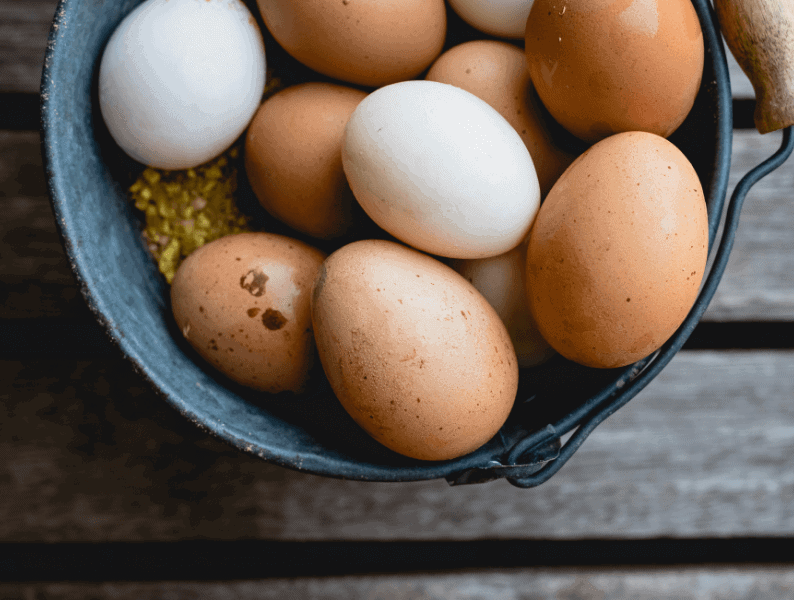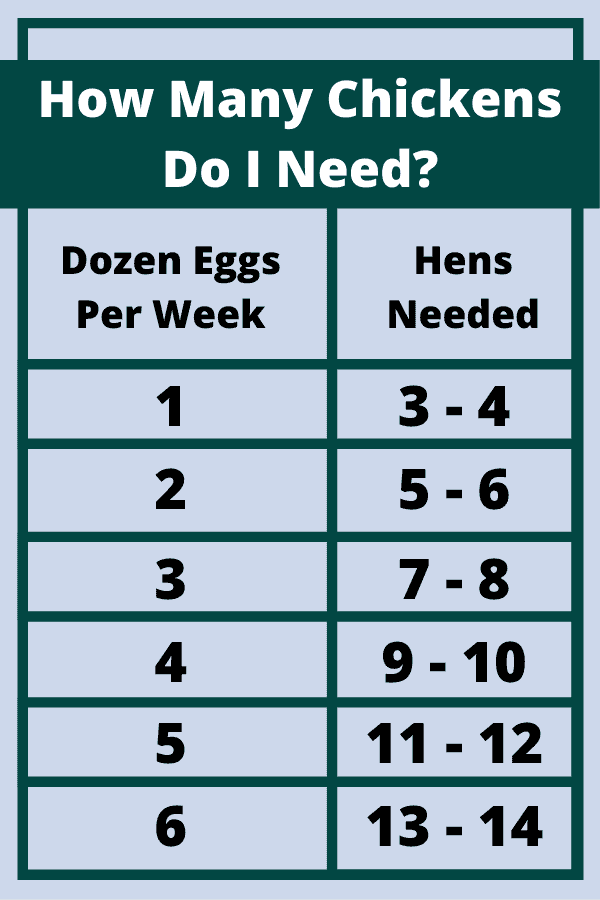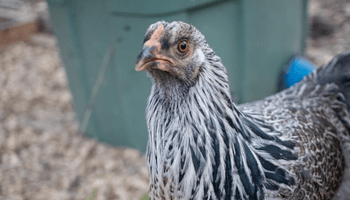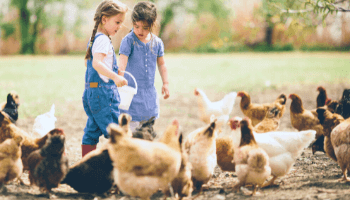When we originally decided to get chickens we weren’t really thinking of using them for eggs. I mean, it was on our long term homesteading goals, sure. But we just saw these little chicks at the gardening store and decided they were coming home with us! Fast forward a few months and they were starting to get bigger. A few of our friends also have chickens for eggs and we quickly decided to expedite this goal for our mini urban homestead. This got me thinking – how many chickens do I need for a dozen eggs a week?
On average you need 3 to 4 hens for a dozen eggs a week. This is because most hens lay around 5 eggs per week, give or take, once they reach laying age. The average number of eggs you get per hen depends on the type of chicken breed you have, the age of the chicken and how often the chickens lay eggs in different seasons. How many chickens you actually need will depend on the size of your family and how often you use eggs.

Disclosure: This post may contain affiliate links. If you purchase a product through one of our affiliate links we make a small commission from the sale at no extra cost to our readers.
How Many Chickens Do You Need For A Dozen Eggs A Week?
It can be tempting to start out with a large flock – especially since baby chicks are so darn cute!
But before you run out to get your chicks, I would encourage you to think about how many chickens you actually need (and can maintain).
I have 10 hens and I get an average of 7-9 eggs from my flock per day – that’s anywhere between 49 – 63 eggs per week!
Now, we use a lot of eggs in my house – eggs for breakfast every morning, lots of quiches and other recipes that use eggs!
But if you don’t need that many eggs, consider getting less chickens.
Choosing your Flock Size
A good way to go about this would be to keep track of how many eggs on average your family consumes.
If it is more than a dozen eggs per week then you would require more than four chickens. The flock size required really depends on your weekly consumption of eggs.
So, let’s assume that you have a standard egg producer chicken (more on that later).
You can properly assume that you will get on average about 5 eggs per week, give or take.
Based on that number you can guestimate the number of chickens per week.
I would start off slow, and add more chickens if need be.

Extra Eggs
There are so many reasons why you would need extra eggs – besides just wanting more chickens of course!
I love to bake – which comes with its fair share of eggs.
Milo, our homestead guard dog loves egg treats!
So even though we are a small family our usage of eggs is a lot.
If you are fond of baking, having guests over or have kids who love to bake or eat eggs then you might want to keep a little margin for extra eggs.
Fresh farm eggs are perhaps the best source of protein and nutrients you can provide to yourself and your family. They are organic and chemical-free and the most important part is you know the source they are coming from!
Plus chickens are super easy to care for!
So, if your egg consumption goes a little overboard from the usual number of eggs you consume, you might want to expand your flock size to give you a few extra eggs.
And check out all these super creative ways to use your extra eggs too!
Sharing is Caring
Not many people in the suburbs keep chickens for eggs.
This number seems to be growing rapidly, in light of recent events, as people want a way to get away from their dependency on the grocery store.
Sharing extra eggs with family and friends is a major reason we opted to get so many hens!
I know that my family isn’t planning on keeping chickens, so having a few extra fresh eggs on hand for gifting is a priority for me!
Selling Fresh Eggs
Another option to consider is to make a small business out of keeping chickens if you have the space – people are always looking for organic, fresh eggs!
Plus, nothing sounds better than making a little money to cover your chicken care costs!
Just be sure to check with local ordinances to see what the laws are regarding selling fresh eggs in your city!
Choosing a Chicken Breed
Some chicken breeds naturally lay more eggs than others.
On average, a single chicken might only lay around four to five eggs a week. But some breeds of chicken lay above the average, while some might lay below the norm.
Something to keep in mind when you have decided to raise chickens for eggs is selecting a breed of chicken that is meant for your homestead goals.
Overall, you have meat chickens, egg producers, dual purpose, and ornamental breeds.
Egg Production Breeds
Egg production chicken breeds are meant to produce lots of eggs consistently. They usually produce medium to large eggs.
Some chicken breeds to consider for eggs are:
- Asian Black
- Buff Orphington
- Cinnamon Queen,
- ISA Brown
- Australorp
- Production Reds
On an average, you can get 5 eggs from these chickens per week – that is if they are less than two years old.
So if you are looking for a high production then these are the breeds you should consider.
In peak production seasons only five of these chickens can also lay up to two dozen eggs!
And if your chickens aren’t laying any eggs, maybe it’s time to ask yourself why your hens aren’t laying eggs.
Meat Chickens
Meat chickens are chickens that are specifically bred for meat. They are usually heavier and are a cross between different types of chickens in order to get the largest, fastest growing bird possible.
Meat chickens do lay eggs, but the quantity and quality of the eggs will not be as reliable as the eggs from chickens meant for egg production.
The chicks that hatch out of mean chicken’s eggs also will not produce the same type of bird as the parents since the parents are a hybrid chicken breed.
Meat chicken breeds include:
- Cornish Cross
- Red Ranger
Dual Purpose Chickens
Another good choice for chicken breeds to keep for eggs are dual purpose chickens.
As the name implies, this type of bird is good to raise for meat and eggs both.
We raise Plymouth Barred Rocks for meat, but other dual-purpose chickens include:
- Plymouth Barred Rocks
- Black Australorp
- Black Jersey Giant
- Buff Orpington
Ornamental Breeds
Ornamental breeds include Polish, Bantams and Silkies. These breeds are not recommended for high egg production.
Usually, folks who enjoy having fancy-looking chickens opt for these breeds as they do look quite a bit different than other chicken breeds.
If high egg production is not your priority and you want good looking chickens that can also give you a few eggs per week then these are the breeds to consider.
You would require at least five to six of these chickens to get a dozen eggs per week.
Seasons Matter
The number of eggs laid also depends on the climate and temperature outside.
Usually chickens produce more eggs when it is warmer outside.
It’s important to weigh these factors so that you can have a healthy and happy flock and also get the production you require weekly.
Most chickens lay well through the summer season until early autumn. The egg production slows down in the winter due to decreased sunlight.
In a few cases, the laying rate can come to a complete halt in the winter season. It really depends on how unforgiving the climate is and the length of the day.
Once spring arrives the chickens slowly fall back to routine into laying an egg per day and as the climate gets warmer the rate becomes constant again.
A few breeds which are considered to be good layers in the winter season are Australorps, Faverolles and Orpingtons.
These breeds, if available in your area, might be able to compensate for the drop in egg production.
Compensate for the Seasonal Changes
If you’re worried about getting less eggs in the colder seasons, you can trick your hens into laying more eggs a couple ways.
Providing an artificial light source in the chicken coop and providing extra feed to increase their energy can help to maintain a steady flow of eggs throughout the year!
Until what age do chickens lay eggs?
The most productive age for chickens to give a good production rate is up to two years. It has been observed that the production rate slowly declines after this age bracket. Therefore, it is recommended to replace at least a third or half of your flock after every two to three years to keep a steady production rate. It is advised to keep a few elderly chickens in the mix as they help to keep the young ones in line – the pecking order is real!
How much space is required for a chicken coop?
Before getting your flock it is very important to check if you have enough space in your area to build a proper chicken coop. One chicken requires at least 4 square feet of space in the coop – but that can include vertical space also to roost. A single chicken requires at least 8-10 square feet for the chicken run. So before investing in a flock, do consider the amount of space you have on your property to provide the chickens with enough space.
What is the Hatchery Error?
If you have ordered your chicks from the hatchery then be prepared to keep an account of the losses. Sometimes some eggs might not make it and other times there is always the probability of hatchery errors. Mostly hatcheries only guarantee a 90% sex accuracy. So, there is always a 10% chance that you might end up with roosters instead of chickens. At the end of the day if you are planning to buy chicks out of the hatchery it is recommended to buy a couple of extra birds just to be on the safe side.
Keeping chickens for eggs is so rewarding – and a great step towards self-sufficiency! Plus, if you have a lot of extra eggs you can always share them with friends and family!
Pin How Many Chickens Do I Need For A Dozen Eggs A Week!






